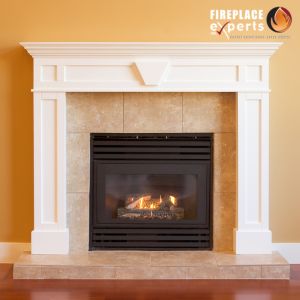The Environmental Benefits of Gas Fireplaces Compared to Wood-Burning Fireplaces
Posted in Gas Fireplace Installation, on August 12, 2024
The inviting glow of a fireplace beckons with a cozy allure that’s almost irresistible in the Canadian winters. However, a gas fireplace installation goes beyond aesthetics and warmth. It brings environmental consciousness and a reduced carbon footprint when compared to wood-burning fireplaces. Choosing the right fireplace type that promises less fireplace maintenance and low carbon emissions is a prudent and convenient decision. Join the Fireplace Experts as we explore the planet-friendly advantages of gas fireplaces compared to a wood-burning unit.
All About Fireplace Emissions & Air Quality
 Emissions are a crucial element when weighing the environmental aftermath of fireplaces. Though fireplace owners cherish their wood-burning units for their crackling logs and quaint rustic charm, they’re notorious for their fireplace maintenance needs and harmful emissions. These fireplaces emit the deadly carbon monoxide, particulate matter like volatile organic compounds (VOCs), and other pollutants. Environmental Protection Agency (EPA) attributes 28 grams of smoke per hour to wood-burning fireplaces—a veritable killer in terms of indoor or outdoor air pollution!
Emissions are a crucial element when weighing the environmental aftermath of fireplaces. Though fireplace owners cherish their wood-burning units for their crackling logs and quaint rustic charm, they’re notorious for their fireplace maintenance needs and harmful emissions. These fireplaces emit the deadly carbon monoxide, particulate matter like volatile organic compounds (VOCs), and other pollutants. Environmental Protection Agency (EPA) attributes 28 grams of smoke per hour to wood-burning fireplaces—a veritable killer in terms of indoor or outdoor air pollution!
In contrast, gas fireplace installation is a much safer and cleaner alternative. Gas fireplaces burn natural gas or propane—a cleaner burn with fewer toxic emissions. Gas fireplace emissions contain a staggeringly 90% fewer particulates than their wood-fueled counterparts. Choose a gas fireplace for the welcoming warmth of a fire without taking a toll on the planet or your home’s air quality.
The Question of Deforestation & Sustainable Sourcing
The impact on forests is another critical environmental consideration when comparing wood and gas fireplaces. Wood-burning fireplaces feed off firewood and fuel deforestation. While some firewood can be sourced from dead or fallen trees, the constant firewood demand can trigger unsustainable logging and deforestation. The resulting harm to natural ecosystems and wildlife habitats is often irreparable.
On the other hand, gas fireplaces rely on either natural gas or propane. While natural gas extraction is not entirely carbon neutral, it’s definitely more sustainable when compared to the deforestation required to supply wood for fireplaces. In fact, gas is a byproduct of other energy production processes, making it a more efficient and less environmentally damaging fireplace fuel option. Considering the broader environmental implications of wood consumption for heating purposes, gas fireplaces have a lower damage quotient. So, if you’re mindful of your ecological footprint, gas fireplace installation is the smarter and greener choice for you!
The Quest for Energy Efficiency
Wood-fueled fireplaces are notoriously inefficient—only a tiny fraction of the heat generated actually warms the home! Most heat escapes through the chimney in traditional open-hearth fireplaces, leaving you scampering to feed more firewood.
In contrast, Modern gas fireplaces are energy warriors with 75-99% efficiency (depending on the model and installation). Thus, a higher percentage of the gas energy is converted into usable heat, which ultimately reduces the overall energy consumption needed to warm your home. The improved energy efficiency of gas fireplaces translates to low resource consumption and a reduced carbon footprint.
The Question of Health Implications & Indoor Air Pollution
Indoor air quality levels directly impact your home’s comfort quotient and health. Smoke from wood-fueled fireplaces contains a deadly cocktail of fine particulate matter, benzene, and formaldehyde. Prolonged exposure to such wood smoke is an invitation to respiratory and cardiovascular issues and other health conditions.
Clean-burning gas fireplaces produce minimal particulate matter and toxic emissions, making them a safer option for better indoor air quality. Gas units are thus a healthier fireplace alternative with a secure and comfortable indoor environment and minimal fireplace maintenance.
Mitigating Your Carbon Footprint
Gas fireplaces provide an undeniable edge over wood-burning ones in terms of overall carbon footprint. Wood-burning fireplaces are red flags for greenhouse gas emissions with the carbon dioxide and other noxious gases they emit into the atmosphere. While gas fireplaces are not entirely carbon-neutral, natural gas burns clean and with fewer carbon emissions than wood-burning fireplaces. A gas fireplace installation is kinder to the planet—your small contribution to the global efforts to mitigate harmful gas emissions.
The Case for Advanced Fireplace Technology
Constant technological advancements in fireplace designs make gas fireplaces a formidable option with superior environmental benefits. Electronic ignition systems in modern gas fireplaces reduce gas consumption by eliminating the need for a standing pilot light. All new programmable thermostats and intelligent controls allow homeowners to optimize energy use and cut energy waste.
Unfortunately, innovations in wood-burning fireplace technology, like catalytic converters and EPA-certified stoves, fall short in the energy race. The inherent inefficiencies and environmental concerns of burning wood remain a burning question. Gas fireplaces are a superior planet-friendly choice with their combination of clean fuel and advanced technology.
Gas Fireplaces: The Greener Choice
Gas units are clear winners when comparing the environmental benefits of wood-burning and gas fireplaces. From lower emissions and comfortable air quality to reduced deforestation and a smaller carbon footprint, gas fireplace installation is a sustainable and planet-friendly option. As environmental stewardship takes center stage, one must consider these factors when choosing a fireplace.
Whether you’re planning a gas unit installation or existing fireplace maintenance, prioritizing environmental considerations is a responsible and forward-thinking approach. Choosing a gas fireplace brings cozy comfort and reliable heating while contributing to a healthier planet. So make the sustainable fireplace choice and call the Fireplace Experts for a gas fireplace installation today!
